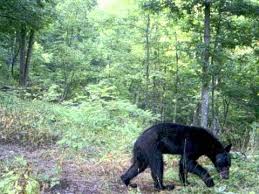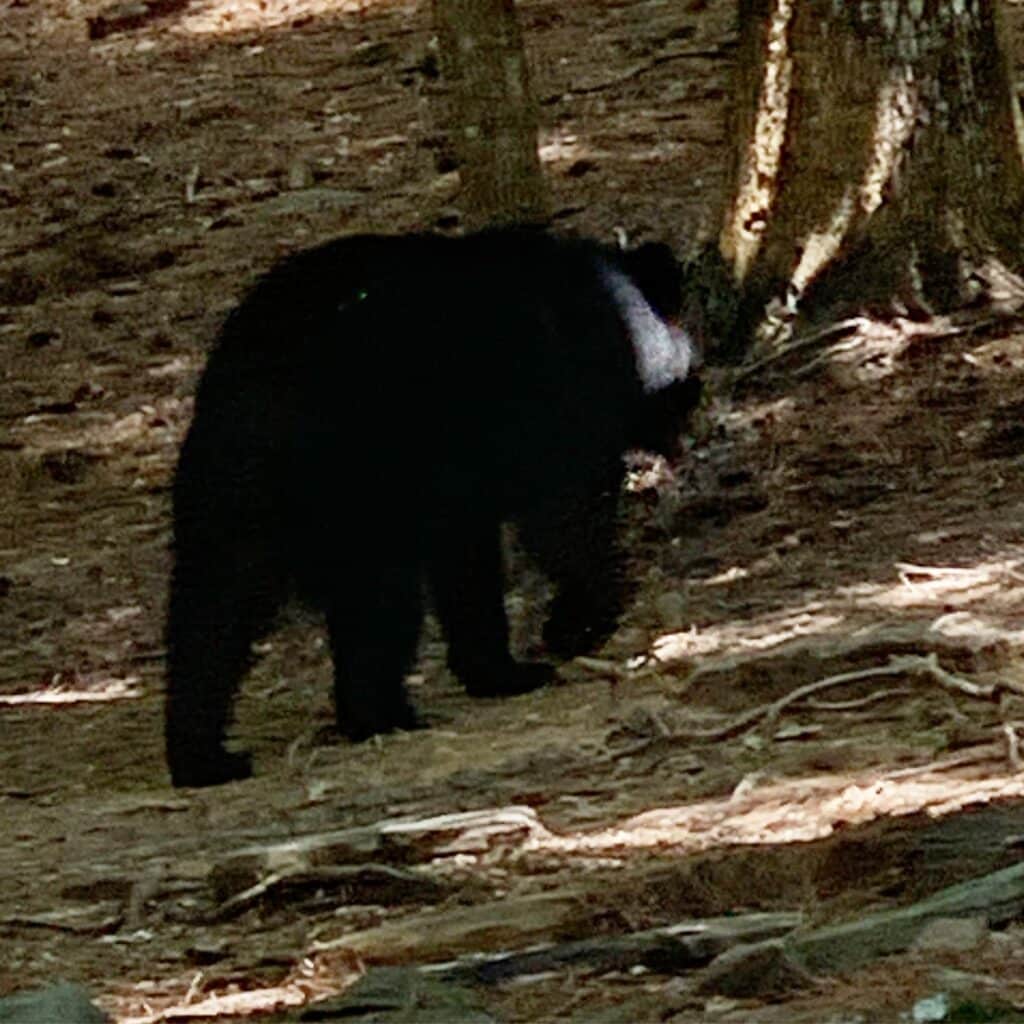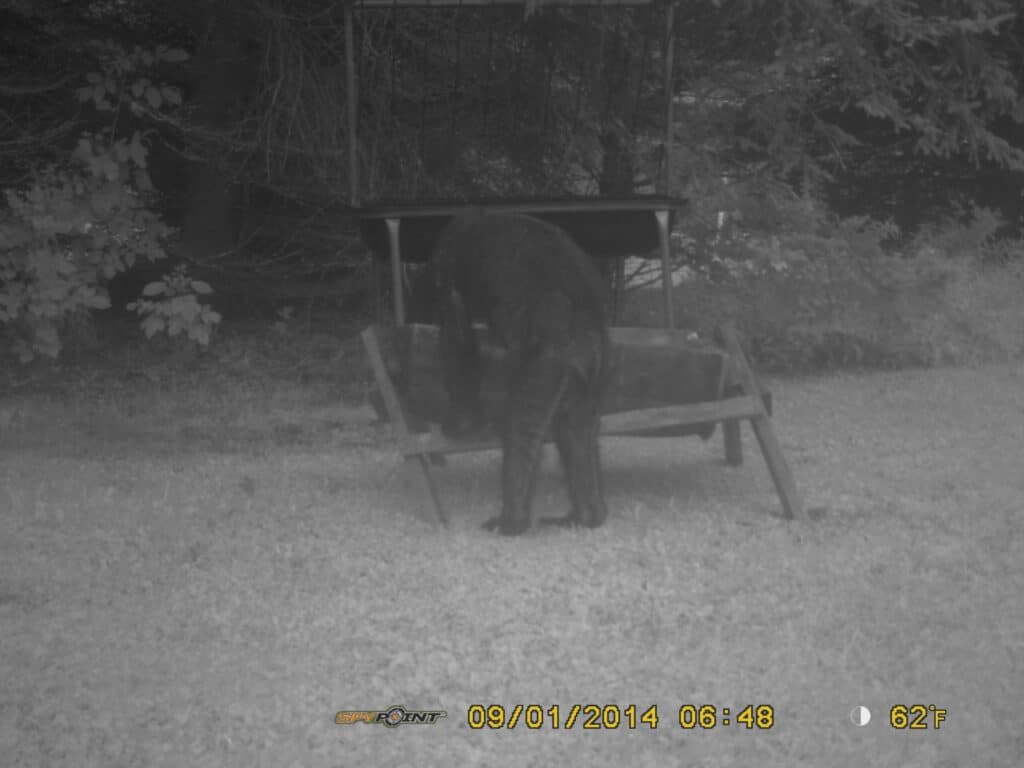
When is a Bear Not a Chimp?

It’s officially spring in Blue Ridge, and with the warmer season comes a lot of excitement for our chimpanzee residents! They love playing in the snow during winter, but spring is a perfect time for them to enjoy the sunshine.
Flowers are blooming, birds are singing, and more grass for grazing means there’s also more opportunities to see native wildlife. But while whitetail deer, foxes, and even wild turkeys are expected, seeing a chimp outside the sanctuary is not. And as temperatures rise, we also see a rise in calls from residents who may have spotted something strange nearby!
Have Chimpanzees Been Spotted in Blue Ridge?
Thankfully, none of our chimpanzees have ever been loose outside the sanctuary!
While all the chimps living with us were born in the United States, they are not native to this area. We take care of chimpanzees that have been retired from medical research and can’t be released into the wild. They haven’t learned the skills they would need in order to survive, so setting them loose would be extremely dangerous. Security at Project Chimps is an important part of our commitment to the safety of the chimps in our care.
That’s not to say that we haven’t received a couple of false alarms, however!
As Manager of Administration, Deanna Stratton is usually the one who receives reports about possible chimpanzee sightings in the area. Most of the time, they’re from residents who have seen something on their property nearby.
“I’ve gotten these calls a few times,” she says. “I’ve been here for four and a half years, and I’ve personally received about six or seven of these calls. Someone will call and say, ‘One of your chimps is in my backyard. You need to come get it.’”

Security at Project Chimps
We take security very seriously at Project Chimps, so calls like these are a big deal! As soon as we have the information we need, we immediately alert staff to start bringing the chimps inside. It’s never happened before, but it’s important we’re prepared just in case.
According to Deanna, we have specific security measures put in place designed for exactly these types of situations.
“Our chimps are in an area where they do not get out, and if they did, we’d notice right away. We have staff here that monitor the chimps all the time, and two barriers of fences that are highly secured. One is around the habitat where the chimps are, and there’s also another we call the perimeter fence. We have security monitoring the gates, as well as a warning system on the fence to notify us in case it’s ever breached.”
“But because there’s been a call, we immediately alert the staff to make sure everyone is accounted for. That’s where the care staff has to do identifications,” she explains. “They have to know everybody’s face and name and be able to identify every chimp for situations just like these. If a chimp did breach the wall, we would call a code and begin our emergency response to the situation. It’s never happened before, but we do practice all the time just in case. Keeping the chimps and the public safe is our top priority.”
But if none of our chimps ever been loose outside the sanctuary, what were people seeing on their property? Staff are divided, with some saying it’s likely a dog while others are convinced it’s a baby Sasquatch. We can’t say for sure, but because these calls are more common during spring, there is one prevailing theory!
Black Bear Season in Georgia
Early spring isn’t just a fun time for chimpanzees — it’s an important season for black bears, too! Although the largest native terrestrial mammal in Georgia, black bears are actually the smallest bear species in North America. They stand about three feet tall when on all fours but can reach over six feet on their hind legs. In addition to their impressive size, they’re also considered a keystone species within this region of the Blue Ridge mountains.
They’re also not the vicious predators many people mistake them for. Black bears are natural omnivores that need to eat a variety of foods to maintain a healthy diet. Although they do eat meat, plants such as grasses and roots make up a significant portion of their food. Just like chimps, black bears also love to eat nuts, fruit, and of course, honey!
Black bears are also highly efficient hibernators with a whole bunch of amazing survival adaptations. They’re able to slow their breathing and heart rate by about 75 percent while maintaining most of their body heat. They choose for themselves when to save energy, meaning they may not hibernate for as long in warmer climates. However, once temperatures begin to rise and more food is available, they’re usually ready to come back into the open.
Is it a Bear or a Chimp?
Because bears lose up to 30 percent of their weight in the winter, they appear much smaller during early spring. Coupled with their shaggy black coats, adorable rounded ears, lighter snouts and their ability to crawl as well as stand, it’s a time that black bears can look remarkably similar to some of our chimpanzees!
“We tend to get these calls more often in the springtime, when bears are coming out. They get more active in the early parts of spring and are out looking for food because they’re hungry. That’s the time most of these calls tend to happen. In fact, I should be getting some any time now!”
Due to the increase in calls around this time, we have reason to suspect that it might be a result of more bears in the area! What we do know for sure is that none of our chimpanzees have left the sanctuary since their arrival.

Our Commitment to Safety
“Chimps are very suspicious of new places, so as a regular chimp behavior they’re not climbing out and running to the neighbor’s yard,” Deanna explains. “This sanctuary is the only place they’ve been outside and played outdoors! They really don’t want to be away from their family.”
In 2018, we published a video of some of our chimpanzees going outside for the very first time. You can see just how nervous they were, often turning back around for a hug or reassurance from a buddy! Seeing them run and play in that same protected space now is truly magical, especially given their history. Effective security is an important part of our mission to provide them with the exemplary care they deserve.
And that includes you, too! Security at Project Chimps is for the surrounding area as well. We’re always more than happy to answer any questions that you might have. If you think you might see one of our chimpanzees outside the sanctuary, by all means, give us a call!
“Odds are, it’s not a chimp,” says Deanna Stratton. “But we will certainly check!”
Want to see where the chimps play every day for yourself? Come for a visit during our Discovery Days events or by scheduling a private tour! We’d love to see you there!

